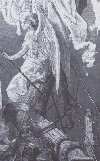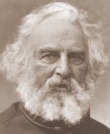|
 El barco fantasma. Longfellow:
El barco fantasma. Longfellow:
En el Magnalia Christy,
de los viejos tiempos coloniales,
puede encontrarse la leyenda en prosa
de lo que aquí está puesto en rima.
Un barco partió de New Haven
y el frío aire que hinchaba las velas,
al zarpar, se llenaba con las
oraciones de los hombres buenos.
"Oh, Señor, si es tu voluntad",
rogaban al Divino,
"sepultar a nuestros amigos el océano
llévatelos, pues tuyos son".
Pero el capitán Lamberton murmuró y
dijo para sí:
"Este barco es tan raro y caprichoso
que temo que sea nuestra tumba".
Y los barcos que venían de Inglaterra,
cuando los meses de invierno pasaron,
no trajeron nuevas de este barco
ni del capitán Lamberton.
La gente se puso a rezar
para que el Señor les permitiera saber
lo que, en su gran sabiduría,
había hecho de sus queridos amigos.
Por fin sus oraciones tuvieron respuesta;
corría el mes de junio
y faltaba una hora para la puesta de sol
de una tarde de viento.
Cuando se vio un barco
dirigirse a tierra con rumbo seguro
y supieron que se trataba del amo Lamberton,
que había partido hacía tanto tiempo.
Se acercó con una nube de velas
contra el viento que soplaba,
hasta que la vista podía distinguir
los rostros de la tripulación.
Entonces cayeron sus firmes mástiles
enredados en los obenques,
y las velas se soltaron
y salieron volando como nubes.
Los palos cayeron, despacio,
uno a uno, arrastrando las jarcias
y todo el conjunto se desvaneció
como la niebla al sol.
Las gentes que vieron este prodigio
dijeron a sus amigos
que aquella era la imagen de su barco
y aquél su trágico final.
Y el pastor del pueblo
Dio gracias a Dios en su oración
Por haber enviado este barco por el aire,
Para calmar sus inquietos espíritus.
(Longfellow)
 My Lost Youth (1858):
My Lost Youth (1858):
I remember the black wharves and the slips,
And the sea-rides tossing free;
And Spanish sailors with bearded lips,
And the beauty and mystery of the ships,
And the magic of the sea.
And the voice of that wayward song
Is singing and saying still:
'A boy's will is the wind's will
And the thoughts of youth are long, long thoughts.'
(Henry Wadsworth Longfellow [1807-1872])
Tales of a Wayside (1874):
Ships that pass in the night, and speak each other in passing;
Only a signal shown, and a distant voice in the darkness;
So on the ocean of life, we pass and speak one another,
Only a look and a voice, then darkness again and a silence.
The Building of the Ship (1849):
Thou, too, sail on, O Ship of State!
Sail on, O Union, strong and great!
Humanity with all its fears,
With all the hopes of future years,
Is hanging breathless on thy fate!
 The Wreck of the Hesperus (1839):
The Wreck of the Hesperus (1839):
It was the schooner Hesperus,
That sailed the wintry sea;
And the skipper had taken his little daughter,
to bear him company.
The Song of Hiawatha (1855):
By the shore of Gitche Gumee,
By the shining Big-Sea-Water,
Stood the wigwam of Nokomis,
Daughter of the Moon, Nokomis.
Dark behind it rose the forest,
Rose the black and gloomy pine-trees,
Rose the firs with cones upon them;
Bright before it beat the water,
Beat the clear and sunny water,
Beat the shining Big-Sea-Water.
|